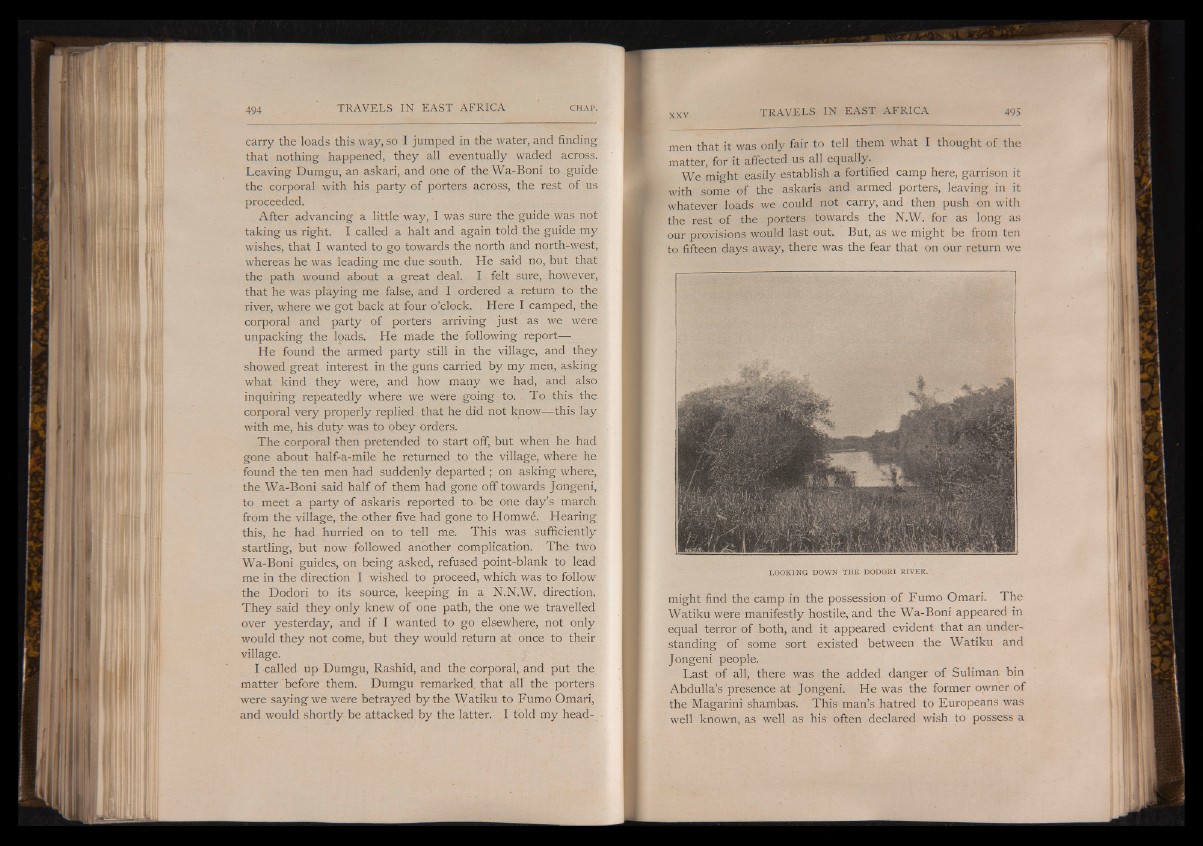
carry the loads this way, so I jumped in the water, and finding
that nothing happened, they all eventually waded across.
Leaving Dumgu, an askari, and one of the Wa-Boni to guide
the corporal with his party of porters across, the rest of Us
proceeded.
After advancing a little way, I was sure the guide was not
taking us right. I called a halt and again told the guide my
wishes, that I wanted to go towards the north and north-west,
whereas he was leading me due south. He said no, but that
the path wound about a great deal. I felt sure, however,
that he was playing me false, and I ordered a return to the
river, where we got back at four o’clock. Here I camped, the
corporal and party of porters arriving just as we were
unpacking the loads. He made the following report—
He found the armed party still in the village, and they
showed great interest in the guns carried by my men, asking
what kind they were, and how many we had, and also
inquiring repeatedly where we were going to. To this the
corporal very properly replied that he did not know— this lay
with me, his duty was to obey orders.
The corporal then pretended to start off, but when he had
gone about half-a-mile he returned to the village, where he
found the ten men had suddenly departed ; on asking where,
the Wa-Boni said half of them had gone off towards Jongeni,
to meet a party of askaris reported to be one day’s march
from the village, the other five had gone to Homwe. Hearing
this, he had hurried on to tell me. This was sufficiently
startling, but now followed another complication. The two
Wa-Boni guides, on being asked, refused point-blank to lead
me in the direction I wished to proceed, which was to follow
the Dodori to its source, keeping in a N.N.W. direction.
They said they only knew of one path, the one we travelled
over yesterday, and if I wanted to go elsewhere, not only
would they not come, but they would return at once to their
village.
I called up Dumgu, Rashid, and the corporal, and put the
matter before them. Dumgu remarked, that all the porters
were saying we were betrayed by the Watiku to Fumo Omari,
and would shortly be attacked by the latter. I told my headmen
that it was only fair to tell them what I thought of the
matter, for it affected us all equally.
We might easily establish a fortified camp here, garrison it
with some of the askaris and armed porters, leaving in it
whatever loads we could not carry, and then push on with
the rest of the porters towards the N.W. for as long as
our provisions would last out. But, as we might be from ten
to fifteen days away, there was the fear that on our return we
LOOKING DOWN THE DODORI RIVER.
might find the camp in the possession of Fumo Omari. The
Watiku were manifestly hostile, and the Wa-Boni appeared in
equal terror of both, and it appeared evident that an understanding
of some sort existed between the Watiku and
Jongeni people.
Last of all, there was the added danger of Suliman bin
Abdulla’s presence at Jongeni. He was the former owner of
the Magarini shambas. This man’s hatred to Europeans was
well known, as well as his often declared wish to possess a